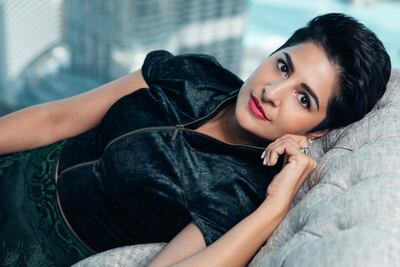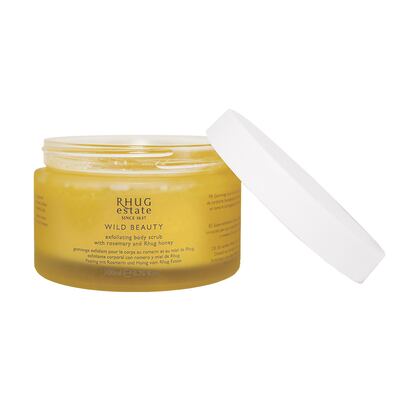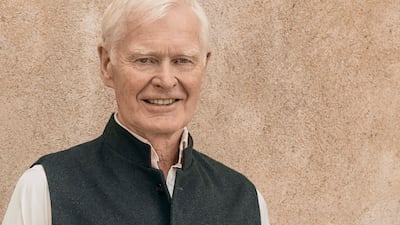Rid yourself of all airs and graces, don’t be afraid to get your hands dirty and work hard every day. These are the three pieces of advice Michael Wynn, war hero and seventh baron of the Rhug Estate in North Wales, passed down to his son Robert, leading purely by example. And the current Lord Newborough has clearly followed that advice, as I discover when I show up 30 minutes early to our meeting in the labyrinthine SLS Dubai Hotel, only to find him already there.
What ensues is a conversation about legacy, sustainability and mortality. “My family is steeped in heritage; we have been around since the ninth century, after all. So I’m conscious that it is important to leave something better behind than one found in the first place… to leave something good for the next generation,” he says.
It explains why, when Newborough inherited his father’s farm in 1998, he set about making all 5,000 hectares of it organic, even receiving the Royal Warrant from Prince Charles for the team’s stewardship of the environment.

Within only a few years, the Rhug Estate’s organic produce became highly sought after by the world’s best chefs and restaurants, including Core by Clare Smyth and Sketch in the UK; Ossiano and At.mosphere in the UAE; and by one Christina Ong, arguably Singapore’s most successful hotelier, owner of the Como Group conglomerate and majority stakeholder in Mulberry, among other luxury brands.
It was this fortuitous entry into the Asian market by way of Ong-owned properties that sowed the seeds, quite literally, for Newborough’s latest adventure: clean beauty. “A chef working at the Mandarin Oriental in Hong Kong came to check out the estate. He looked around the farm, turned to me and said: ‘What I want as well as meat is wild forage. I want you to supply me all these lovely ingredients you have growing wild on your property.’ And that’s when I started thinking about skincare, about what ingredients we had on the estate that I could use in an organic and natural range,” says Newborough.
Rhug Wild Beauty was born less than two years later, after Newborough approached a formulator with 20 years of experience with natural and organic beauty products, and got her to cherry-pick about 20 ingredients sourced from the plants found around the farm. These ingredients are unusual, to say the least, yet are packed to the petal with skincare goodness.
Nettle, for example, is rich in vitamins A, C, D and several B vitamins to boost radiance; gorse flower helps to tone the skin with its astringent properties; the milk from organic oats has antibacterial and anti-inflammatory properties to cleanse and soothe; and lemon balm, which is a member of the mint family, contains two potent antioxidants – caffeic and ferulic acids – that protect against environmental stress.
Mushroom root, heather, hawthorn, dandelion and elderflower are some other ingredients used in this skincare range, which is available in the UAE exclusively through clean-beauty portal Secret Skin, founded by breast cancer survivor Anisha Oberoi, who labels the collaboration between her platform and Rhug as “serendipitous”.
The Wild Beauty line, which hit the market last September, includes a cleansing lotion, eye cream, skin tonic, day and night creams, lip treatment and face mask. One of its bestselling products on Secret Skin, the Exfoliating Body Scrub, uses honey that comes from the estate’s own bees. “This has natural healing properties, promotes collagen building and works to moisturise the skin,” says Newborough.
“The momentum for conscious beauty around the world is gathering pace, led by Australia, the US and the UK,” he says. “I felt the time was right to build on this global awareness and, with a well-thought-out strategy, use the resources and the expertise we have at home to hook into the conscious consumer.
“When I went into organic farming in the 1990s, few people saw a future in it. Now it is becoming mainstream because people understand how important it is to eat food produced in a way that doesn’t involve the use of fossil fuels, and that hasn’t been sprayed and produced in a way that damages the environment. Clean beauty is the same. It is honest, the products are not tested on animals, many items are vegan, they are sustainably packaged and toxin-free. And clean beauty is here to stay. It may not be your quick fix, but it will be a long-term solution to more healthy skin and a better lifestyle.
“I really don’t see myself as different to anyone else and yet I am aware that it is important to lead by example because that is what is expected of you.” And, ever the gentleman, he says: “With Secret Skin, we have found a partner who understands the values of clean beauty, who cares about honesty in the market and is as passionate about sustainability as we are. Anisha Oberoi is visionary, driven and passionate about what she is doing. This is her crusade and we are happy to be part of it.”

The Wild Beauty range benefits equally from Newborough’s present-day philosophy as it does the provenance of his family and farm. “It’s true to say that our heritage has been a strong influence on what I am doing, but the uniqueness also comes from the fact that these wild foraged ingredients are hand-picked on an organic estate in a beautiful, pollution-free part of the world.
“Next year we hope to bring out eight new products, one of which is a body serum. I think there is a growing desire to take as much care of the skin on your body as your face,” says Newborough, who may run a team of 130 people working across the various facets of the Rhug Estate, but who is still fully in the know about every single aspect of Wild Beauty.

“Because I’m so old, I’m always in a hurry to do things,” he says, belying his wry observation with the fact that he works out for 90 minutes every morning, and plays tennis and golf (“the latter under duress”). The rest of his day is spent as much on estate work as on social media, which he acknowledges is “essential” to the success of almost every brand today.
“I spend far too much time on Instagram, but I’m lucky because I’ve got idyllic material to work with, from my dog Truffles, to the lovely deer and wild flowers all around. My office is my farm.”
It’s also through social media that Newborough can get his message across to the target audience he believes is the ultimate Wild Beauty consumer, one who appreciates not only the natural source of the ingredients, but also the vegetable inks and dyes, and the recycled glass bottles, plastic caps and cardboard packaging. “The younger set are very much into saving the planet, they care about what is written on the back of the pack, they get what sustainable skincare is all about and they are the ones who aspire to something that is kinder and better for their skin. Slow beauty is in their DNA,” he says.
The pandemic, too, has a part to play in our quest for sustainability – even, or especially, among purveyors of luxury, he says. “Luxury is quality and, as far as skincare is concerned, luxury is honesty. It’s using uncompromising ingredients, supported by certification. Big things happened during Covid; people started to focus more on what was healthy for them and good for the planet.
“The things we do at Rhug, from organic farming and green energy generation, to luxury skincare, all share the same principle of using the assets God gave us, the soil, the wind, the sun and the heat in the ground, to produce something that is good for our health and kind on the environment.”


